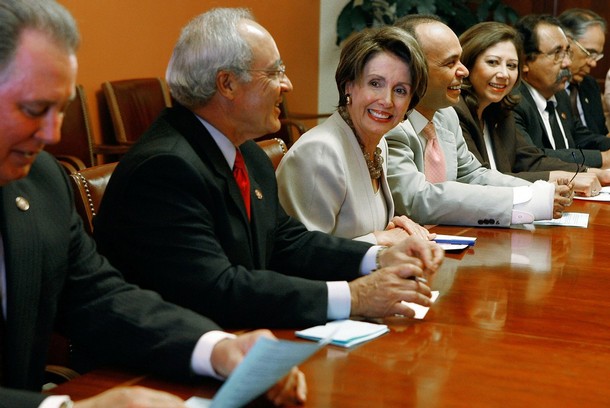The Congressional Hispanic Caucus, 40 percent of whose members are fellow Californians of Ms. Pelosi, voted 12 to 8 against the bailout.
Speaker Nancy Pelosi normally enjoys warm relations with members of the House’s black and Hispanic caucuses, but a large number of them revolted Monday against legislation, which she supported, to rescue the financial industry.
“The last thing I need to do is go back home and tell people I voted for $700 billion,” said Xavier Becerra, Democratic representative from California.
Class differences were laid bare by the vote. Several members of the two all-Democratic caucuses, who are now working among themselves and with the House leadership to put forward a compromise, characterized the defeated bill as one that would have provided assistance to the rich at the expense of middle- and lower-income voters. And it is to those voters that the lawmakers must answer.
Representative Xavier Becerra, whose district includes some of Los Angeles’s poorer precincts, said, “The last thing I need to do is go back home and tell people I voted for $700 billion, some of which will touch the same people that caused the problem, and I can’t guarantee taxpayers will recoup those costs.”
The Congressional Hispanic Caucus, 40 percent of whose members are fellow Californians of Ms. Pelosi, voted 12 to 8 against the bailout, while the Congressional Black Caucus rejected it by 21 to 18. The overall vote was 228 to 205, meaning that a shift of 12 votes from nay to aye would have brought passage.
While two-thirds of House Republicans wound up opposing the bill, Ms. Pelosi, as promised, delivered votes from half the Democratic members (actually a bit more). But her inability to corral more votes from two often reliable blocs spoke to deep misgivings about the bill’s particulars, the notion among the members’ constituents that a vote in favor would mean alignment with Republicans to help Wall Street, and a degree of confusion and uncertainty about the depth of the financial crisis.
Mr. Becerra, Ms. Pelosi’s assistant speaker, defended her Tuesday, saying that while she had never pressured him, she had done all she could to gain support for the measure. He attributed its failure to a refusal by President Bush and House Republicans to include protections for people who had gone bankrupt or were losing their homes.
Representative Jesse L. Jackson Jr. of Chicago put it more starkly.“We need to bail out the country, not the country club,” Mr. Jackson said, speaking by phone Tuesday from Washington as he prepared to participate in a meeting intended to revive some version of the legislation.“I would hope greater homeowner protections would not be seen as unreasonable,” he said, “since the foundation of the economy is homeownership, where the crisis began.”
Representative José E. Serrano of the Bronx, too, presented his position as one of looking after the little guy.
“I represent the poorest district in the nation, located in the richest city on earth, in walking distance of the wealthiest district, on the Upper East Side,” Mr. Serrano said. “People on Wall Street, without regulation of the financial services industry, they created a false economy based on inflated home values. The middle class and the poor didn’t reap any benefits from that. Whether or not we bail them out, we cannot put this on the backs of the poor and working class.”
Members of the caucuses who did support the bill agreed with the leadership that it was a difficult but necessary step at a time of predictions that the economy might crumble without it.
Representative Dennis Cardoza of California, a self-styled fiscal conservative whose Central Valley district has experienced some of the largest numbers of mortgage defaults, said voting for the bill “makes you want to vomit.” But he agreed that it was needed to avoid economic collapse.
“Not enough members understand the economics of both the situation and what is in the bill,” Mr. Cardoza said. “There are some who let ideological purity get in the way.”
Among those opposing the measure was the chairman of the Hispanic caucus, Representative Joe Baca, who represents a Los Angeles-area district. Mr. Baca made clear Tuesday that he would push hard to include in a compromise bill the creation of a new government agency, the Family Foreclosure Rescue Corporation, which would finance loans to people in foreclosure or serious default.
The idea, backed by several members of both caucuses who voted no on Monday, would allow families to refinance their mortgages through a government-administered loan with a set interest rate.
“Now we have the opportunity to submit our own proposal,” Mr. Baca said, “and make this better.”


Recent Comments